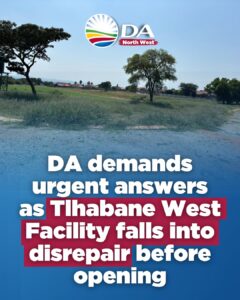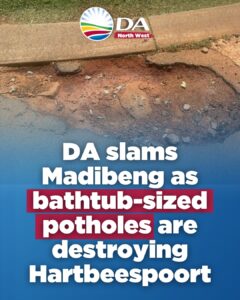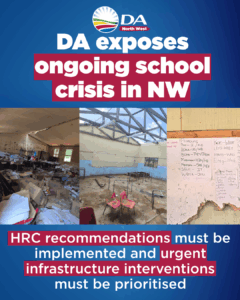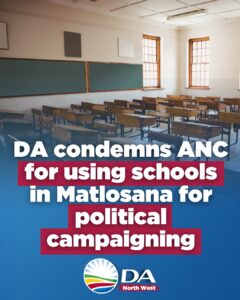The DA in Ditsobotla will demand that the MEC of COGTAHS, Lenah Miga, come to Council and explain why the North West Provincial Government has failed to intervene in Ditsobotla through either Section 139(1)(a) or (b) or Section 139(5)(a) or even Section 139(7) of the Constitution considering that the Ditsobotla Council was elected less than a year ago.
The dissolution of the newly elected Ditsobotla Council is a decision based purely on the inability and unwillingness of the ANC to enforce discipline amongst its elected Councillors and is an abuse of the Constitution.
There is no indication that a provincial administrator will be able to fix Ditsobotla.
Since 2014 there have been 20 Section 139 interventions into North West Municipalities with no improvement whatsoever. Every intervention since 2014 has failed because the ANC cannot and will not act against its Councillors for their failures.
North West Municipalities are some of the worst governed municipalities in South Africa.
The collapse in governance and service delivery in Ditsobotla is due to the ANC’s factional infighting, not only within the ANC Caucus in Ditsobotla, over positions and power over the finances and tender process, but also between the ANC factions at provincial and even national level.
Another major contribution to the general dysfunctionality of the Ditsobotla Local Municipality is the ANC’s own internal dispute over elected ANC Councillors and how they made it to the lists before the 2021 local government elections.
It is evident that the biggest cause of the collapse of Ditsobotla is political in nature. The ANC is unable to maintain inter-party-political discipline as factions vie for control over positions to further corruption and advance greedy self-interest.
Dissolution will not solve either the political or administrative problems in Ditsobotla. Municipal officials, especially at a middle management level, have also aligned themselves to various ANC factions, and are abusing their official positions to advance the party-political interests of the various ANC factions through the manipulation of their roles and levels of authority.
These municipal officials are also prone to undermining directives set by senior administrative management, municipal managers, the CFO and senior directors, in favour of ANC party political infighting.
To solve the ANC’s political problem, the party can easily recall ANC Councillors who are fuelling the chaos in Ditsobotla and Ward by-elections in affected wards can be held.
To fix the administration of Ditsobotla, a full skills audit must be conducted. Municipal officials found to have been implicated in advancing or participating in political infighting must be suspended, and placed before a disciplinary process, and where guilty, employment must be terminated.
The entire Ditsobotla administration’s organogram must be reviewed, and skilled and experienced individuals should be recruited outside of the area since the ANC has poisoned the technical and administrative functions of Ditsobotla.
In addition, skilled, experienced, and qualified senior management, such as the Municipal Manager, CFO and Directors, should be recruited along the strictest interpretation of legislation and permanently appointed in order to begin the process of professionalising the municipality’s administration. There must be a clear track record of these individuals showing that they are not politically compromised.
Then, together with National Treasury, a recovery plan must be implemented to ensure the recovery and future sustainability of Ditsobotla.
Crucially, a Section 139(1)(c) dissolution of Ditsobotla would immediately remove opposition party Councillors, which is a great injustice against the people of Ditsobotla who voted for opposition parties to hold the ANC government accountable. With a Section 139(1)(c) dissolution, the oversight function as mandated in the Constitution falls away, leaving the ANC-appointed Administrator to do whatever he or she pleases without any multiparty oversight or accountability mechanisms in place.
Without any opposition oversight over the Administrator in Council, the door for the further abuse of power and corruption is wide open.
In any case, Ditsobotla has been destroyed by the ANC, and changing one ANC faction with another without addressing the politicisation of the administration will never see Ditsobotla become sustainable.






